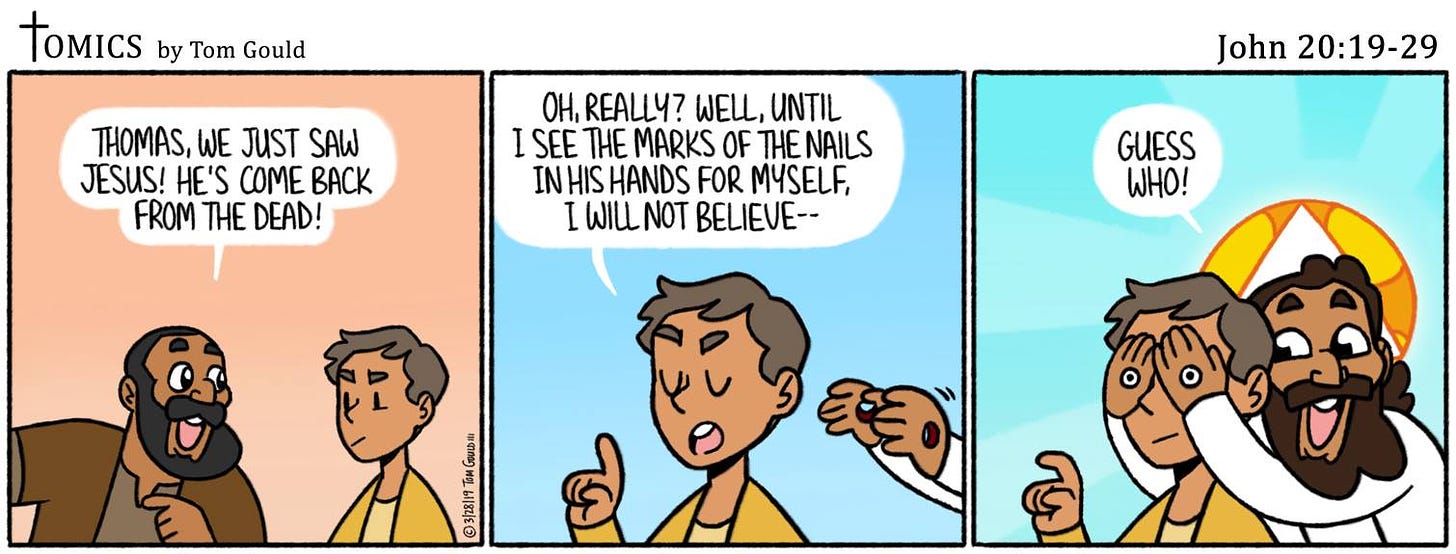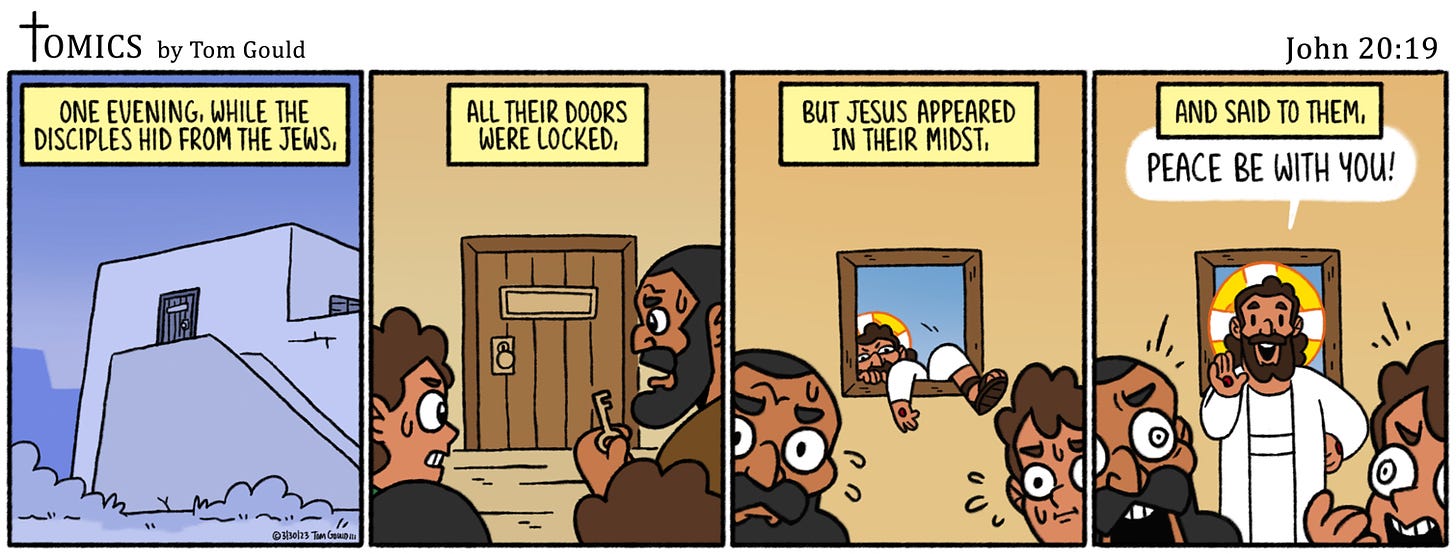Today is also known as the Sunday of Divine Mercy. It was instituted in 2000, a few days after the canonization of St. Faustina. Jesus had appeared before her, and gave her instructions for the Divine Mercy Chaplet. He also asked her to convince the Church to institute the Feast of Divine Mercy—
On that day the very depths of My tender mercy are open. I pour out a whole ocean of graces upon those souls who approach the fount of My mercy. The soul that will go to Confession and receive Holy Communion shall obtain complete forgiveness of sins and punishment. On that day are open all the divine floodgates through which graces flow.
So, this is your reminder to go to confession if you didn’t during Lent!
Note to Free Subscribers:
Substack has finally implemented a feature I’ve been requesting since almost the beginning—the comments section automatically unlocks at the same time the post does. You should be able to comment on posts by the time you get the notification. Feel free to test it out on today’s post!
Reading 1
Acts 4:32-35
The community of believers was of one heart and mind, and no one claimed that any of his possessions was his own, but they had everything in common. With great power the apostles bore witness to the resurrection of the Lord Jesus, and great favor was accorded them all. There was no needy person among them, for those who owned property or houses would sell them, bring the proceeds of the sale, and put them at the feet of the apostles, and they were distributed to each according to need.
Being of “one heart and mind” sounds great, doesn’t it? Especially in these contentious times we live in.
By focusing on Jesus, the community was able to bring themselves together to do what He asked of us—to love God with our whole heart, soul, and mind; and to love our neighbors like ourselves. 1
Responsorial Psalm
Ps 118:2-4, 13-15, 22-24
R. Give thanks to the LORD for he is good, his love is everlasting.
Let the house of Israel say,
“His mercy endures forever.”
Let the house of Aaron say,
“His mercy endures forever.”
Let those who fear the LORD say,
“His mercy endures forever.”
R. Give thanks to the LORD for he is good, his love is everlasting.
I was hard pressed and was falling,
but the LORD helped me.
My strength and my courage is the LORD,
and he has been my savior.
The joyful shout of victory
in the tents of the just:
R. Give thanks to the LORD for he is good, his love is everlasting.
The stone which the builders rejected
has become the cornerstone.
By the LORD has this been done;
it is wonderful in our eyes.
This is the day the LORD has made;
let us be glad and rejoice in it.
R. Give thanks to the LORD for he is good, his love is everlasting.
The psalmist points to times Israel called to God for help against invading enemies, and God responded with mercy. The refrain reminds us to be thankful for all the times God has been merciful to us.
You can take it a step further, even. Thank God for His answer to your petitions before you even see the results. Always bear in mind, the answer may not be what you wanted or expected, but we can be confident it will be the most merciful response.
***
Reading 2
1 Jn 5:1-6
Beloved: Everyone who believes that Jesus is the Christ is begotten by God, and everyone who loves the Father loves also the one begotten by him. In this way we know that we love the children of God when we love God and obey his commandments. For the love of God is this, that we keep his commandments. And his commandments are not burdensome, for whoever is begotten by God conquers the world. And the victory that conquers the world is our faith. Who indeed is the victor over the world but the one who believes that Jesus is the Son of God?
This is the one who came through water and blood, Jesus Christ, not by water alone, but by water and blood. The Spirit is the one that testifies, and the Spirit is truth.
Bishop Barron’s homily this week speaks to the nature of faith.
I’ve heard him say that faith is “supra-rational” before, but I didn’t really get what that meant until now. Belief isn’t something we hold until we find a rational reason; it’s the opposite. True faith is supported by where our rational minds take us. It’s a step beyond reason.
Alleluia
Jn 20:29
R. Alleluia, alleluia.
You believe in me, Thomas, because you have seen me, says the Lord;
blessed are they who have not seen me, but still believe!
R. Alleluia, alleluia.
Gospel
Jn 20:19-31
On the evening of that first day of the week, when the doors were locked, where the disciples were, for fear of the Jews, Jesus came and stood in their midst and said to them, “Peace be with you.”
When he had said this, he showed them his hands and his side. The disciples rejoiced when they saw the Lord. Jesus said to them again, “Peace be with you. As the Father has sent me, so I send you.” And when he had said this, he breathed on them and said to them, “Receive the Holy Spirit. Whose sins you forgive are forgiven them, and whose sins you retain are retained.”
Thomas, called Didymus, one of the Twelve, was not with them when Jesus came. So the other disciples said to him, “We have seen the Lord.” But he said to them, “Unless I see the mark of the nails in his hands and put my finger into the nailmarks and put my hand into his side, I will not believe.”
Now a week later his disciples were again inside and Thomas was with them. Jesus came, although the doors were locked, and stood in their midst and said, “Peace be with you.” Then he said to Thomas, “Put your finger here and see my hands, and bring your hand and put it into my side, and do not be unbelieving, but believe.”
Thomas answered and said to him, “My Lord and my God!” Jesus said to him, “Have you come to believe because you have seen me? Blessed are those who have not seen and have believed.”
Now, Jesus did many other signs in the presence of his disciples that are not written in this book. But these are written that you may come to believe that Jesus is the Christ, the Son of God, and that through this belief you may have life in his name.
I’ve always thought it unfair that, after one bout of skepticism, St. Thomas will forever be known as “Doubting Thomas.” I mean, Jesus did something that no one in history had ever done before. I feel like “Perfectly Reasonable Thomas” would be a better nickname.
My middle name is Thomas, so I always took this story a little personally. Matthew is a writer, but Thomas is the one who wouldn’t believe his friends. He would only trust the evidence of his own senses.
Jesus knows Thomas isn’t the only one; in fact, the number of Perfectly Reasonable Thomases only grows over time. Faith truly is a blessing.
It also helps that they were a relatively small community; when you know every individual, it’s pretty easy to identify their needs. The larger a group is, the harder it is to know what “loving your neighbor” means at scale.





